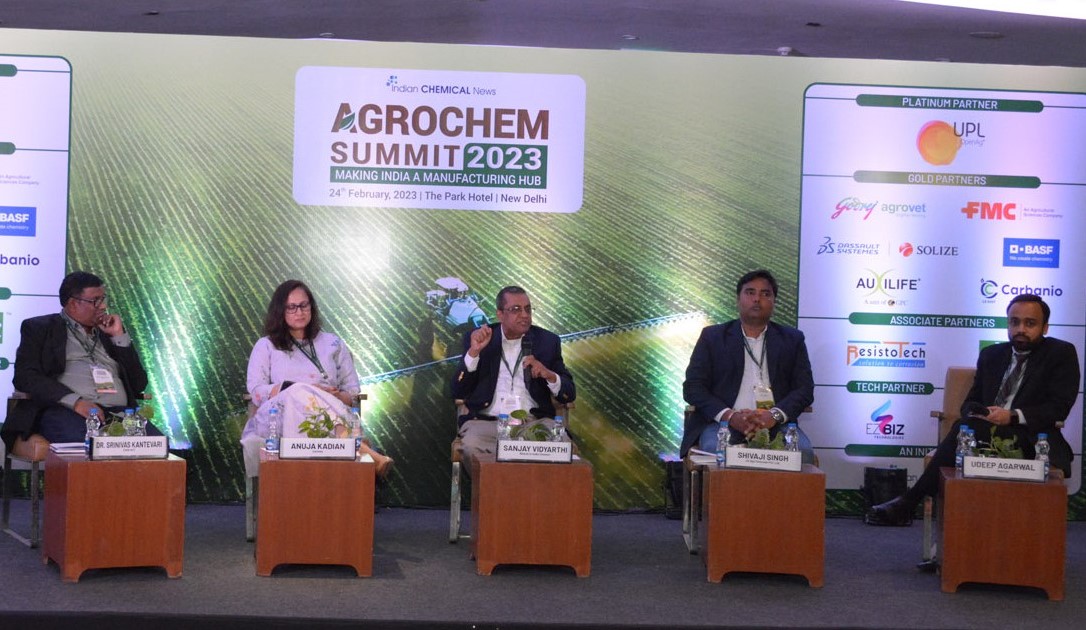The session discussed collaborative approach to maximize use of agrochemicals; developing R& D ecosystem; devising strategy for improving exports; and role of sustainability

The third session at the AgroChem Summit 2023, organized by the Indian Chemical News (ICN) on February 24, 2023 in New Delhi was focused on the collaborative approach to unlocking massive untapped potential of agrochemicals.
Leading experts at the session titled, ‘Collaborative Approach to Realise Agrochemicals Potential’ shared their views on the topics such as collaborative approach to maximize use of agrochemicals; need for crop specific advisory and farm management services; growing agrochemicals market value chain; developing R&D ecosystem; devising strategy for improving exports; role of sustainability to help in realising agrochemicals potential.
India’s agriculture productivity which is the worst in the world and right use of agrochemicals can help in setting it right, remarked Sanjay Vidyarthi, Founder, Bharat to India Connect.
Vidyarthi elaborates further: “In 30 years, there won’t be enough food for an extra 10 billion people globally. There would be another 200 million people showing up soon in India. At the same time, we have 160 million hectares including 68 million irrigated land available in India for agriculture activities. Interestingly, the per capita consumption should be about 2000 calories for women and 2500 calories for men but we are not even close. With such dynamics, we can create an industry that can make India a feeding bowl of the world. The major challenge is India’s agriculture productivity which is the worst in the world. Currently our wheat productivity is 2.4 tonnes per hectare as compared to 8.9 per hectare globally, rice is 3.8 tonnes per hectare whereas best in class is 12 tonnes per hectare. In the case of vegetables it is 13.7 tonnes per hectare compared to the best in class of 76.5 tonnes per hectare. If we use the agrochemicals in the right place with the right quantity, we can achieve our productivity goals.”
While corporations make strategies to increase the business, they often pay less attention to the pivotal role of farmers and need to educate them, said Shivaji Singh, General Manager, JU Agri Sciences.
“The farmer must know what is good for him in terms of the category of products to choose from and the ones that fit well for increasing his productivity and also address sustainability. Industry is taking interest in biological products and we do have a large number of such products. A lot of big names are coming into this segment which is attractive in terms of trade. We are taking a lead with our R&D facility trying to innovate such products that will de-stress the environment. The pyramid of influence includes government and universities, corporate and big farmers, dealer networks, and media. The information has to reach the farmers through joint efforts of all the stakeholders,” explained Singh.
The government must incentivize the R&D for innovation and manufacturing of raw materials,” said Anuja Kadian, Government & Industry Affairs Director (Asia Pacific), Corteva Agriscience.
Kadian mentioned: “India is already a huge manufacturing hub. The question is how we retain the momentum and strengthen it further. Agrochemical manufacturing ecosystem can’t be looked at in isolation as it has to be backed up with bilateral trade relations that are extremely important. The R&D incentives are equally important as without it there can’t be much value coming out. The triple helix model of innovation which will be government, academia and private sector collaboration to drive the innovation both pathbreaking as well as incremental one. Lastly, the intellectual property protection for the products coming into India. All these points are critical for India’s rise as value creation hub and not just a low cost manufacturing hub. Since we are still dependent on other nations for raw materials and technical ingredients, the geo-political alignments affect trade relations.”
Dr Srinivas Kantevari, Senior Principal Scientist, CSIR IICT talked about the need for industry academia collaboration to innovate new molecules and increase the efficiency of old ones.
“Among the few issues faced by the industry in manufacturing are yield improvement, applications and cost. We work with the industry to try reducing the cost or improve the yield by using reverse engineering. The drastic improvements are happening with the new technologies to develop the pesticides that every farmer would like to use. These days there are talks about new agrochemicals which are low volume but those technologies are not available. Therefore, we have approached the government and created a mission project that is called CSIR Agro Mission. We have at least 22 molecules and we want the industries to come forward for collaboration. The project is a going to start from April 2023. In generics, we are looking for off patent generics and at the same time polymorphism where the old molecules are repackaged in low dosage yet active form is trending these days. Then there are hybrid formulations where you see a lot of botanicals. With this approach where the combination of botanicals versus the chemical reduces the dosage, we reduce the toxicity. Industry can collaborate with us even if in small ways,” said Dr Kantevari.
“Agrochemical industry has been playing a critical role in bolstering agricultural productivity in the country. It has helped immensely the exports and reduced the trade deficit. However, we see a lot of under-penetration of agrochemicals and that presents a lot of opportunities as well as challenges. However, it is clear that there are exciting times ahead for the industry,” mentioned Uddit Agarwal, Principal, Kearney who moderated the discussion.
Subscribe to our newsletter & stay updated.